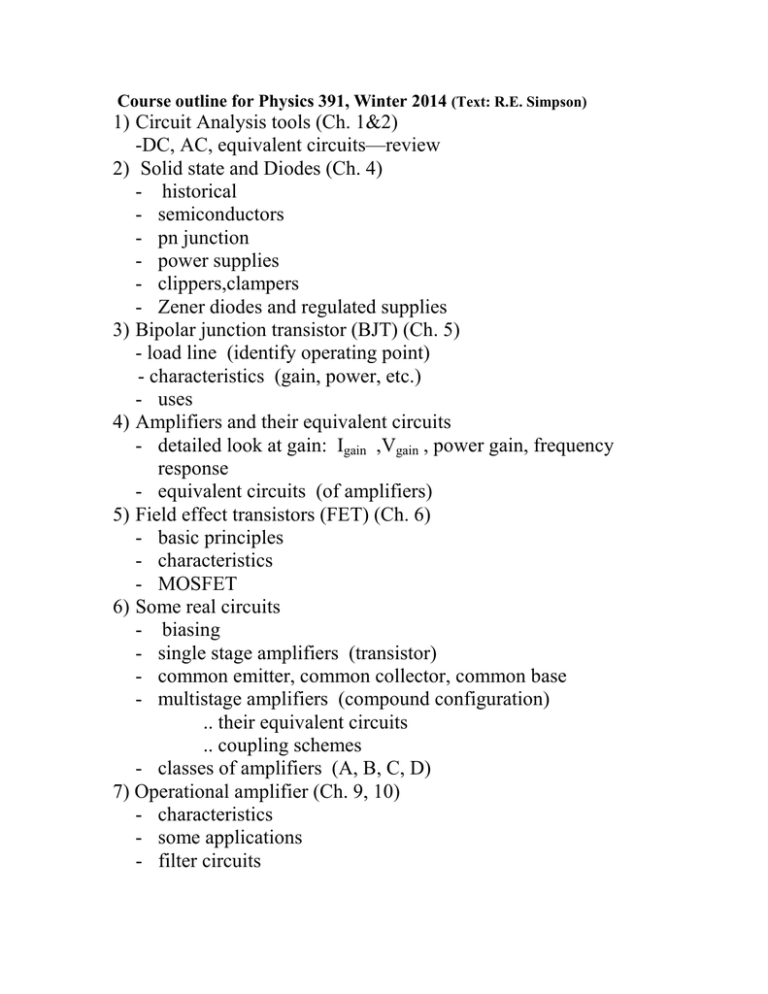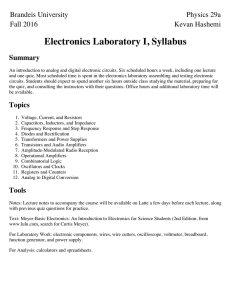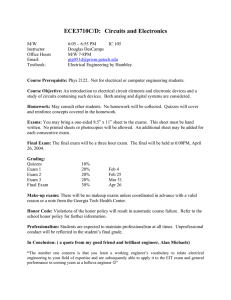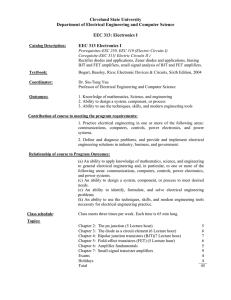
Course outline for Physics 391, Winter 2014 (Text: R.E. Simpson)
1) Circuit Analysis tools (Ch. 1&2)
-DC, AC, equivalent circuits—review
2) Solid state and Diodes (Ch. 4)
- historical
- semiconductors
- pn junction
- power supplies
- clippers,clampers
- Zener diodes and regulated supplies
3) Bipolar junction transistor (BJT) (Ch. 5)
- load line (identify operating point)
- characteristics (gain, power, etc.)
- uses
4) Amplifiers and their equivalent circuits
- detailed look at gain: Igain ,Vgain , power gain, frequency
response
- equivalent circuits (of amplifiers)
5) Field effect transistors (FET) (Ch. 6)
- basic principles
- characteristics
- MOSFET
6) Some real circuits
- biasing
- single stage amplifiers (transistor)
- common emitter, common collector, common base
- multistage amplifiers (compound configuration)
.. their equivalent circuits
.. coupling schemes
- classes of amplifiers (A, B, C, D)
7) Operational amplifier (Ch. 9, 10)
- characteristics
- some applications
- filter circuits
8) Feedback, Oscillators (Ch. 7)
- negative, positive feedback
- oscillators
9) Noise (Ch. 8)
- types of noise
- amplifier noise
- reduction/circumvention of noise
Physics 391 W14
Electronics
Instructor: Hartwig Peemoeller , Rm Phys 366
peemoell@uwaterloo.ca
Office hours: To be announced
Lectures: Monday, Wednesday, Friday 1:30-2:20 in DWE 1515
Lecture format: Power point/overhead slides
- example problems worked out on blackboard
Prerequisite: One of PHYS 222, 224, 241, 242, 252; Corequisite: PHYS 391L
Term test:
February 26, 6:30-8:00 pm in MC 4046
Final examination: Scheduled by the registrar’s office
Resources:
Course Web Site: LEARN (Assignments and supplementary information will be posted there)
Required Textbook: “Introductory Electronics for Scientists and Engineers, 2nd edition”,
by Robert E. Simpson, Allyn and Bacon Inc. 1987
Other useful texts: “The Art of Electronics, 2nd edition”, by
Horowitz and Hill, Cambridge University Press, 1989
“Electronic Devices and Circuit Theory, 10th edition”, by Boylestad and Nashelsky, Pearson
Prentice Hall, 2009
Course objectives: By the end of the course students will
•
be able to recognize and describe the basic building blocks (diodes, transistors, resistors,
capacitors, inductors) of modern electronics and computers.
•
have the ability to solve and design simple linear and non-linear circuits.
-- to look at a simple circuit and be able appreciate what the various segments are for and how
the circuit is functioning
•
be able to explain the basic solid-state physics of semiconductor devices.
•
be able to list, describe and apply electronics techniques for reducing noise and performing
precise and accurate measurements.
Course content: Chapters 1, 2, 4 – 11 of “Introductory Electronics for Scientists
and Engineers, 2nd edition”, by Robert E. Simpson, augmented by lecture material:
•
•
•
•
•
•
•
•
DC circuits (Ohm’s law, Kirchhoff’s laws, Norton and Thevenin equivalents)
Time-varying circuits (Capacitance, Inductance, alternating current (AC), LCR circuits, impedance,
phasors, filters, bandwidth)
Diodes (Semiconductor physics and doping, rectifiers)
Bipolar Junction Transistors (equivalent circuits, BJT amplifiers)
Field Effect Transistors (FET amplifiers, MOSFETS)
Operational Amplifiers (Feedback, Amplification, Differentiation, Integration)
Feedback and oscillators
Noise considerations
Project:
The project is worth 20 % of your final mark. (10 % for the report and 10 % for a 10 minute
presentation to the class).
Project description
Build a circuit and write a brief (3 page max) description of how it works. This does not need to be
an original design – i.e. it can be copied from a magazine etc... A possible way to start would be to
build a pre-designed kit (AM or FM receiver, microphone, LED display, Theremin, …). This will get
you used to soldering, reading schematics ... The important point is that you understand how the
circuit works and can explain it to others.
Course grade:
Final exam: 50%
Midterm exam (Mid February): 15%
Problem sets (about 6-8): 15%
Project: 20%
Note re assignment returns:
The assignments will be marked and returned to you (normally in a week) by being placed inside
cardboard boxes outside room 366 in physics (see the Note below).
NOTE: Marked assignments will be left in boxes outside of room physics 366 for no longer than
two weeks. Students who prefer an alternative return method must so advise the instructor (HP)
by email by January 20, 2014 and staple an appropriately sized stamped self-addressed envelope
to each assignment submitted so that it may be returned by mail.
Unclaimed assignments: Unclaimed assignments will be retained until one month after term
grades become official on Quest. After that time, they will be destroyed in compliance with UW’s
confidential shredding procedures.
Important Dates:
See the University of Waterloo website for important dates connected with your program.
For students with disabilities:
AccessAbility Services, located in Needles Hall, Room 1132, collaborates with all academic
departments to arrange appropriate accommodations for students with disabilities
without compromising the academic integrity of the curriculum. If you require academic
accommodations to lessen the impact of your disability, please register with AccessAbility
Services at the beginning of each academic term.
Some Academic Regulations:
1) Academic integrity: In order to maintain a culture of academic integrity, members of
the University of Waterloo community are expected to promote honesty, trust, fairness,
respect and responsibility.
Note on avoidance of academic offences: All students registered in the courses of the
Faculty of Science are expected to know what constitutes academic integrity, to avoid
committing academic offences, and to take responsibility for their actions. When the
commission of an offence is established, disciplinary penalties will be imposed in accord
with Policy #71 (Student Academic Discipline). For information on categories of offences
and types of penalties, students are directed to consult Policy #71
(http://www.adm.uwaterloo.ca/infosec/Policies/policy71.htm). If you need help in
learning what constitutes an academic offence; how to avoid offences such as plagiarism,
cheating, and double submission; how to follow appropriate rules with respect to “group
work” and collaboration; or if you need clarification of aspects of the discipline policy, ask
your TA and/or your course instructor for guidance. Other resources regarding the
discipline policy are your academic advisor and the Undergraduate Associate Dean.”
Grievance: A student who believes that a decision affecting some aspect of his/her
university life has been unfair or unreasonable may have grounds for initiating a
grievance. Read Policy #70, Student Petitions and Grievances, Section 4. When in doubt
contact the department’s administrative assistant who will provide further assistance.
Discipline: Students are expected to know what constitutes academic integrity, to avoid
committing academic offenses, and to take responsibility for their actions. Students who
are unsure whether an action constitutes an offense, or who need help in learning how to
avoid offenses (e.g., plagiarism, cheating) or about “rules” for group work/collaboration
should seek guidance from the course professor, academic advisor, or the Associate Dean
of Science for Undergraduate Studies. For information on categories of offenses and types
of penalties, students should refer to Policy #71, Student Discipline. For information on
typical penalties, students should check Guidelines for the Assessment of Penalties,
www.adm.uwaterloo.ca/infosec/guidelines/penaltyguidelines.htm.
Appeals: A decision or penalty imposed under Policy 33 (Ethical Behavior), Policy #70 (Student
Petitions and Grievances) or Policy #71 (Student Discipline) may be appealed, if there is a
ground. Students, who believe they have a ground for an appeal should refer to Policy #72
(Student Appeals).
Waterloo's Office of Academic Integrity provides numerous resources on academic integrity
for students, faculty and staff.
2) Travel and final exam period: “Student travel plans are not considered acceptable grounds
for granting an alternative examination time.” (You may wish to start checking the registrar’s
web site starting in the middle of February:
(http://www.registrar.uwaterloo.ca/exams/finalexams.html).
3) Make-up exams, tests, assignments: In general there will be no make-up exams, make-up
tests or make-up assignments for PHYS 391. Exceptions due to illness, or other reasons beyond
the student’s control, will be considered on an individual basis.
4) Verification of Illness form (VIF) or other compelling documentation.
If a student is unable to complete course requirements (usually final exam, midterm test), then
the student must inform the instructor (ideally, beforehand but within 48 hours of the exam)
and present the appropriate documentation (i.e. a completed VIF or other compelling
documentation) within five business days.
Please be aware that only VIFs issued from our campus Health Services
(https://uwaterloo.ca/health-services/ ) will be acceptable documentation when the service is
available (https://uwaterloo.ca/health-services/student-medical-clinic/after-hours-clinics).
A student who is sick on a weekend, during off‐hours, while out of town or receiving ongoing
care from a family physician or specialist may have to provide valid and suitably informative
VIF from other health service providers. Information should include
1) date of the physician assessment
2) dates of illness
3) level of incapacitation, and
4) whether the diagnosis was made by the physician or based on description by the student.
This policy will also apply to non‐Science students taking Science courses.



